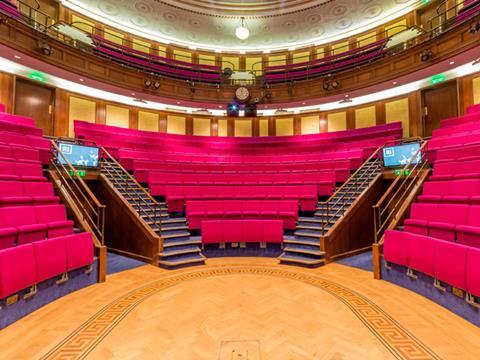The theme for the 2016 Chemistry World science communication competition was public attitudes to chemistry
The 2016 competition is now closed. Click here for information about the 2017 science communication competition!
Are you passionate about science, writing and science communication? The 2015–16 Chemistry World science communication competition offers a fantastic opportunity to be published in Chemistry World, and demonstrate your communication skills in a ten-minute presentation at the Royal Institution’s iconic Faraday theatre during our live final.
Send us your 800 word article addressing or exploring an issue or theme uncovered by the Royal Society of Chemistry’s public attitudes to chemistry survey. You also need to submit a short video (less than two minutes long) showing off your presentation style.
Closing date: 8 January 2016 11.59 pm GMT
Live final:21 March 2016

This year’s theme
Earlier this year the Royal Society of Chemistry carried out some large-scale research on public attitudes to chemistry. This research has caused us to question how we communicate chemistry to wider audiences as well as challenging our perceptions of how the public respond to and engage with chemistry, chemicals and chemists.
We’re asking entrants to explore or address an issue or theme uncovered by the research with the ultimate aim of improving our chemistry conversations. For example, you could write about:
· Chemistry is something you do at school, not something you do in your everyday life
· How chemistry relates to society’s biggest challenges like energy, the environment, food and water
· Emotional responses to chemistry
· Unpicking the confusion between pharmacists and chemists
· Why chemists think the public are more negative about chemistry than they actually are
This year’s awards
There are two awards available depending on your age at the deadline for submissions – 8 January 2016.
· If you will be under 16 years old on the 8 January 2016, you will be entered in to the Rising Star award.
· If you will be at least 16 years old on the 8 January 2016 you will be entered in to the Science Communicator award.
Each award has different rules for entry and terms and conditions, so please check the specific details regarding the award you will be entering.
Rules for entry
The same rules apply for both the Rising Star and Science Communicator awards. You should submit:
A written entry: Articles should be clear and concisely written, suitable for publication in Chemistry World, and no more than 800 words in length excluding headline and references.
A video entry: Show us how well you can present your chosen topic in no more than two minutes. It’s not about Hollywood production values, so webcam or mobile videos are fine.
Shortlisting and selection
There are different shortlisting processes for each award:
Science Communicator award: Five shortlisted entrants will be notified by Friday 22 January 2016.
Rising Star award: One winner will be selected from entries and will be notified by Friday 22 January 2016.
Read our frequently asked questions for more information.
Prizes
There are different prizes for each award:
Science Communicator award
The winner will:
· Receive £500
· Be published in Chemistry World
· Have the opportunity to take part in a special assignment with Chemistry World and AkzoNobel (read about last year’s assignment here)
The four remaining finalists will receive £250.
Rising Star award
The winner will:
· Receive £250
· Be published in Chemistry World
· Receive an AkzoNobel outreach workshop at your school for you and your class
Video recordings of all finalists’ live shows will be published on the Chemistry World website.
Stuck for ideas?
Read the Royal Society of Chemistry’s report on the public attitudes to chemistry survey, read last year’s winning pieces, watch the RSC’s public lecture series and find out what the judges are looking for.
Eligibility
The competition is open to anyone of any age from anywhere in the world – school children and students, teachers and technicians, PhD students and researchers. You don’t have to be a member of the Royal Society of Chemistry to participate. The competition is open only to new science communicators; those who have professional (paid) science communication experience are ineligible.
Entrants must be available for the whole of Monday 21 March 2016, and be in London from 9 am to attend the live finalists’ event. The second round judging will take place on the day. Read more about the final here.
How to enter
To enter, you should email chemistryworld@rsc.org, by 8 January 2016, with the following:
· Your written entry attached as a PDF or Word document
· A link where we can download or view your video
· Your name, contact information and where you heard about this competition
· Which category you are entering
Please make sure to read our rules, terms and conditions before submitting your entry.













No comments yet